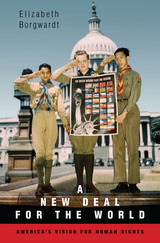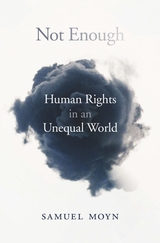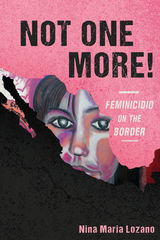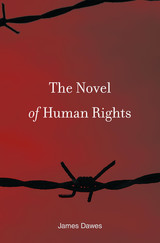7 start with N start with N


In a work of sweeping scope and luminous detail, Elizabeth Borgwardt describes how a cadre of World War II American planners inaugurated the ideas and institutions that underlie our modern international human rights regime.
Borgwardt finds the key in the 1941 Atlantic Charter and its Anglo-American vision of “war and peace aims.” In attempting to globalize what U.S. planners heralded as domestic New Deal ideas about security, the ideology of the Atlantic Charter—buttressed by FDR’s “Four Freedoms” and the legacies of World War I—redefined human rights and America’s vision for the world.
Three sets of international negotiations brought the Atlantic Charter blueprint to life—Bretton Woods, the United Nations, and the Nuremberg trials. These new institutions set up mechanisms to stabilize the international economy, promote collective security, and implement new thinking about international justice. The design of these institutions served as a concrete articulation of U.S. national interests, even as they emphasized the importance of working with allies to achieve common goals. The American architects of these charters were attempting to redefine the idea of security in the international sphere. To varying degrees, these institutions and the debates surrounding them set the foundations for the world we know today.
By analyzing the interaction of ideas, individuals, and institutions that transformed American foreign policy—and Americans’ view of themselves—Borgwardt illuminates the broader history of modern human rights, trade and the global economy, collective security, and international law. This book captures a lost vision of the American role in the world.

After World War II dozens of non-governmental organizations (NGOs) emerged on the global scene, committed to improving the lives of the world's most vulnerable people. Some focused on protecting human rights; some were dedicated to development, aimed at satisfying basic economic needs. Both approaches had distinctive methods, missions, and emphases. In the 1980s and 90s, however, the dividing line began to blur.
In the first book to track the growing intersection and even overlap of human rights and development NGOs, Paul Nelson and Ellen Dorsey introduce a concept they call "new rights advocacy." New rights advocacy has at its core three main trends: the embrace of human rights-based approaches by influential development NGOs, the adoption of active economic and social rights agendas by major international human rights NGOs, and the surge of work on economic and social policy through a human rights lens by specialized human rights NGOs and social movement campaigns.
Nelson and Dorsey draw on rich case studies of internationally well-known individual NGOs such as Amnesty International, Human Rights Watch, Oxfam, CARE, ActionAid, and Save the Children, and employ perspectives from fields of human rights, international relations, the sociology of social movements and of complex organizations, and development theory, in order to better understand the changes occurring within NGOs.
In questioning current trends using new theoretical frameworks, this book breaks new ground in the evolution of human rights-development interaction. The way in which NGOs are reinventing themselves has great potential for success—or possibly failure—and profound implications for a world in which the enormous gap between the wealthiest and poorest poses a persistent challenge to both development and human rights.

“No one has written with more penetrating skepticism about the history of human rights.”
—Adam Kirsch, Wall Street Journal
“Moyn breaks new ground in examining the relationship between human rights and economic fairness.”
—George Soros
The age of human rights has been kindest to the rich. While state violations of political rights have garnered unprecedented attention in recent decades, a commitment to material equality has quietly disappeared. In its place, economic liberalization has emerged as the dominant force. In this provocative book, Samuel Moyn considers how and why we chose to make human rights our highest ideals while simultaneously neglecting the demands of broader social and economic justice.
Moyn places the human rights movement in relation to this disturbing shift and explores why the rise of human rights has occurred alongside exploding inequality.
“Moyn asks whether human-rights theorists and advocates, in the quest to make the world better for all, have actually helped to make things worse… Sure to provoke a wider discussion.”
—Adam Kirsch, Wall Street Journal
“A sharpening interrogation of the liberal order and the institutions of global governance created by, and arguably for, Pax Americana… Consistently bracing.”
—Pankaj Mishra, London Review of Books
“Moyn suggests that our current vocabularies of global justice—above all our belief in the emancipatory potential of human rights—need to be discarded if we are work to make our vastly unequal world more equal… [A] tour de force.”
—Los Angeles Review of Books

Finding theories of new materialism inadequate to explain the feminicidios, Lozano critiques and extends this approach—advancing instead a new theoretical framework, border materialism, to argue that capitalist systems of neoliberalism and free trade are directly correlated to the killing of women on the US–Mexico border. Through the author’s fifteen-plus years of on-the-ground fieldwork, readers are presented with firsthand accounts, testimonies, and new social movement strategies from family members and activists attempting to stop these gendered crimes.
By offering concrete case studies—including analysis of maquiladoras/factories and free trade zones, public monuments and murals memorializing the victims, rastreos/searches by family members for victims’ DNA remains, and testimony from Mothers, family members, and activists—Not One More! lays bare the socioeconomic and geopolitical forces at work in the killing of women in Juárez.

The Novel of Human Rights defines a new, dynamic American literary genre. It incorporates key debates within the contemporary human rights movement in the United States, and in turn influences the ideas and rhetoric of that discourse.
In James Dawes’s framing, the novel of human rights takes as its theme a range of atrocities at home and abroad, scrambling the distinction between human rights within and beyond national borders. Some novels critique America’s conception of human rights by pointing out U.S. exploitation of international crises. Other novels endorse an American ethos of individualism and citizenship as the best hope for global equality. Some narratives depict human rights workers as responding to an urgent ethical necessity, while others see only inefficient institutions dedicated to their own survival. Surveying the work of Chris Abani, Susan Choi, Edwidge Danticat, Dave Eggers, Nathan Englander, Francisco Goldman, Anthony Marra, and John Edgar Wideman, among others, Dawes finds traces of slave narratives, Holocaust literature, war novels, and expatriate novels, along with earlier traditions of justice writing.
The novel of human rights responds to deep forces within America’s politics, society, and culture, Dawes shows. His illuminating study clarifies many ethical dilemmas of today’s local and global politics and helps us think our way, through them, to a better future. Vibrant and modern, the human rights novel reflects our own time and aspires to shape the world we will leave for those who come after.

READERS
Browse our collection.
PUBLISHERS
See BiblioVault's publisher services.
STUDENT SERVICES
Files for college accessibility offices.
UChicago Accessibility Resources
home | accessibility | search | about | contact us
BiblioVault ® 2001 - 2024
The University of Chicago Press









